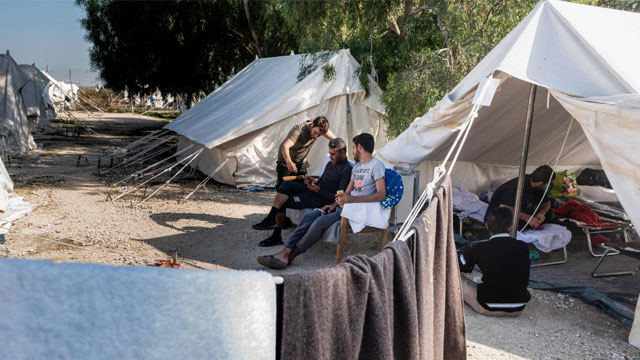In the thick of the coronavirus lockdown in Cyprus, authorities gave a group of asylum seekers a stark choice: move to an overcrowded camp or go home.
The Mediterranean island deemed it a necessary step to save money -- the tiny country of just one million people now has Europe's highest per capita rate of asylum applications.
For the migrants, it was tough, said one Nigerian, who now lives in a cluster of UN tents and prefabricated huts surrounded by razor wire, a facility built for 200 people that now houses some 800.
He was one of the dozens of asylum seekers who had initially been housed at hotel apartments in the coastal resort of Ayia Napa, which was otherwise deserted because of the pandemic.
One day, he says, they were told: "Either you get on the bus or you sign a paper saying that you want to go back to your country."
"It was so fast, nobody had time to decide," he said. "Everything was in a rush, we didn't have time to read the paper."
The Nigerian man, who asked not to be named, is now among the hundreds living in the Pournara camp in Kokkinotrimithia near the capital Nicosia, where a May heatwave saw temperatures soar to 43 degrees centigrade (109 Fahrenheit).
The move angered rights groups such as the Cyprus Refugee Council, which said migrants face "very difficult conditions" in the "closed, overcrowded and tented camp... without clear information as to when they will be allowed to leave".
But Cyprus says it can no longer afford the 19-million-euro ($21-million) annual bill to house migrants in hotels and is asking for European Union help as the influx shows no sign of abating.
Interior minister Nikos Nouris told AFP that for many migrants, the alternative to camps is unsafe city accommodation run by unscrupulous landlords.
Nouris wants to accelerate asylum procedures and repatriations, insisting that "we have a huge volume of migrants, and 75 per cent are not refugees".
The EU says that in spring 2019, Cyprus was receiving three times as many asylum applications per month, adjusted for population, as Greece.
The influx is in part due to the troubled history of Cyprus, the easternmost member of the EU which lies just 80 kilometres (50 miles) from the Turkish coast, and has been divided since a military conflict in 1974.
The Republic of Cyprus controls the south while a breakaway Turkish-backed entity controls the northern third and is recognised only by Ankara.
In recent years, northern Cyprus has become a gateway for growing numbers of migrants who arrive by boat.
Many, like the Nigerian man, then slip across the 184-kilometre UN-controlled buffer zone, even as it officially remains closed under coronavirus restrictions.
Tough message
Since the migrant "Balkans route" from Turkey to central Europe was blocked in 2015, asylum applications in Cyprus have soared -- from 2,253 that year to 13,648 in 2019, the interior ministry says.
While many hail from countries rocked by conflict and ethnic strife -- particularly Syria and Cameroon -- the ministry says that Indian, Pakistani and Bangladeshi applicants far outnumbered those fleeing war zones so far this year.
Nouris insisted that "yes, we are very willing to host refugees. But we can no longer host in this country, in these numbers, all the economic migrants".
Since the Nigerian man was transferred to the camp on orders from Nouris's office, he has been unable to leave. Despite eased coronavirus restrictions, migrants remain detained there under a health ministry order citing a scabies outbreak in the camp.
Doros Polycarpou of migrants' rights group KISA said moving people to camps with no chance to appeal was "a serious violation" of existing rules.
"This is the way of giving the message: don't come to Cyprus any more."
Another Nigerian asylum seeker, who also asked to remain anonymous, said that faced with the choice in early May, he had opted for repatriation.
"I was in the camp before, when I first arrived in Cyprus," he said. "I don't want to go back. Ever. It's a horrible place."
'Very difficult time'
Nouris said improvements were under way and that once the scabies outbreak was dealt with, migrants would be allowed to come and go from Pournara, as with Kofinou, another migrant camp.
He also said Cyprus had reported zero COVID-19 cases among migrants.
Nouris, appointed in December, is pushing to accelerate asylum procedures, hiring new staff and proposing legislation to slash the wait for a final decision.
He is also launching a multilingual SMS campaign to inform migrants that Cyprus, which is outside Europe's open-borders Schengen area, is not a gateway to the EU.
Crucially, he called for more EU support, citing the challenges of integrating large numbers of refugees into a small population.
He warned that the challenge for Cyprus could escalate again in the coming months.
"If Turkey... continues sending people to the occupied parts of Cyprus" who then cross the buffer zone, he said, "we're going to have a very, very difficult time."





